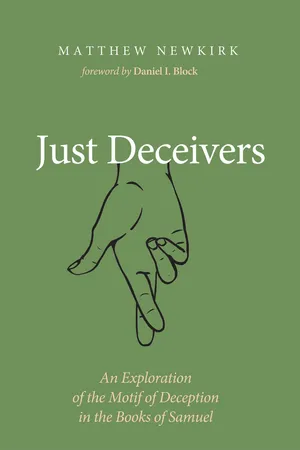![]()
1
Introduction
In most contexts deception is considered an immoral activity, and many view the Bible as supporting this conclusion. Passages such as the ninth command of the Decalogue (Exod 20:16) and the injunctions against false speech in the Book of the Covenant (Exod 23:1–8) are often said to prohibit all forms of lying and deception. However, others read the same texts and conclude very differently. For example, Richard A. Freund writes: “a standard of absolute truthfulness does not seem to be a major issue in the Hebrew Bible.” Furthermore, in many biblical narratives, some acts of deception seem to be depicted positively. In Gen 38:13–18 Tamar disguised herself as a prostitute and deceived Judah to get him to impregnate her. At the end of the episode Judah himself evaluated her actions positively: “She is more righteous than I” (Gen 38:26, NIV). In Exod 1:19 the midwives lied to Pharaoh to cover up their disobedience to his death sentence against the Hebrew boys. The narrator seemingly affirms their actions by commenting, “So God was good to the midwives” (Exod 1:20), and, “He gave them families” (Exod 1:21). After hiding the Hebrew spies, Rahab lied to her own king concerning the spies’ whereabouts (Josh 2:4–6) and was rewarded by being spared in the destruction of Jericho. Subsequently she was so thoroughly incorporated into Israel (Josh 6:25) that she became an ancestress of King David and Jesus (Matt 1:5). The writer of Hebrews even lists her among Israel’s models of obedient faith (Heb 11:31). These positive depictions show that the issue of deception is complex and requires close analysis of legal, prescriptive, and narrative texts.
However, this situation raises many other questions. How should readers view an act of deception in a biblical narrative, especially when it involves lying? What situational characteristics are present when deception is depicted positively? Do these positive depictions of deception in biblical narratives cohere with the Bible’s ethical prescriptions concerning lying and honesty? These and similar questions have been explored in several monographs on deception in the Pentateuch as well as in studies of deception in the OT broadly. However, even though the books of 1 and 2 Samuel contain the highest density of narrative episodes involving deception in the OT, no full-length examination of the motif of deception in this corpus exists. This study seeks to fill this gap.
Definition of Deception
Previous Definitions
Discussions of deception in biblical scholarship often lack a rigorous definition of the term. Many studies do not define the term at all, which has led to subsequent methodological confusion. Others have provided definitions, but in most cases they do not incorporate scholarly insight from philosophical studies on the phenomenology of deception, which results in imprecision. For example, Gregory H. Harris writes, “Deception, at its core, is a lie in place of the truth.” This definition simply equates deception with lying, yet historically philosophers have distinguished between lying and deception; the former occurs when one communicates a falsehood and the latter occurs when one causes someone to believe a falsehood. Although the goal of lying is to deceive and lying may result in deception, one may lie without deceiving (i.e., a lie may not be believed) and one may deceive without lying (i.e., through ambiguous language or physical motions rather than explicit communication). Thus deception is formally distinct from lying.
In her study of lying and deception in biblical narrative, Ora Horn Prouser offers this definition:
Prouser rightly emphasizes (1) that deception is necessarily intentional and (2) that it causes someone to believe something (in this case, “that which the deceiver does not [believe]”). However, according to this definition, a deception could theoretically result in the receiver believing something that is true. For example, if the soccer game begins at 4:00, but the deceiver (x) falsely believes the game begins at 3:00, and x tells the receiver (y) that the game begins at 4:00, intending to deceive y by making him believe something that x does not believe, and y shows up to the soccer game on time at 4:00, it cannot be said that x has deceived y. Certainly x has lied to y, but he has not deceived him, since deception must involve y believing something false.
In his study of deception in Genesis, Michael James Williams defines deception as follows:
Like Prouser’s, Williams’s definition could theoretically result in y adopting a true belief, since this definition only specifies that x does not hold the belief in question, not that the belief is actually false. Furthermore, this definition focuses only on the intention of x without specifying that y must actually adopt the false ...
